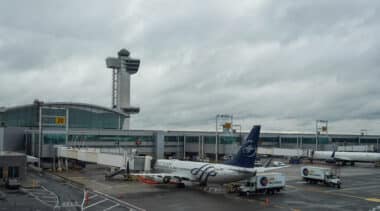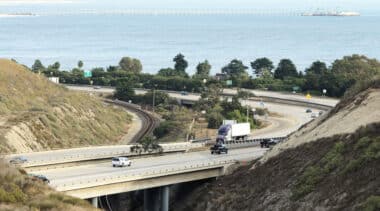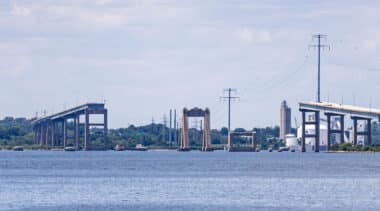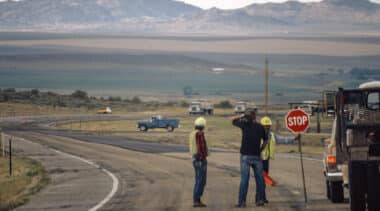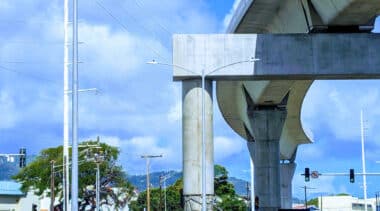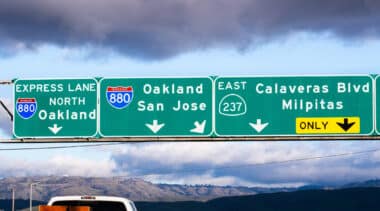Robert Poole is director of transportation policy and Searle Freedom Trust Transportation Fellow at Reason Foundation.
Poole, an MIT-trained engineer, has advised multiple presidential administrations and transportation departments on infrastructure issues.
Surface Transportation
In the field of surface transportation, Poole has advised the Federal Highway Administration, the Federal Transit Administration, the White House Office of Policy Development, National Economic Council, Government Accountability Office, and state Departments of Transportation in numerous states.
Poole's 1988 policy paper proposing privately financed toll lanes to relieve congestion directly inspired California's landmark private tollway law (AB 680), which authorized four pilot toll projects including the successful 91 Express Lanes in Orange County. More than 20 other states and the federal government have since enacted similar public-private partnership legislation. In 1993, Poole oversaw a study that coined the term HOT (high-occupancy toll) Lanes, a term which has become widely accepted since.
California Gov. Pete Wilson appointed Poole to the California's Commission on Transportation Investment and he also served on the Caltrans Privatization Advisory Steering Committee, where he helped oversee the implementation of AB 680.
From 2003 to 2005, he was a member of the Transportation Research Board's special committee on the long-term viability of the fuel tax for highway finance. In 2008 he served as a member of the Texas Study Committee on Private Participation in Toll Roads, appointed by Gov. Rick Perry. In 2009, he was a member of an Expert Review Panel for Washington State DOT, advising on a $1.5 billion toll mega-project. In 2010, he was a member of the transportation transition team for Florida's Governor-elect Rick Scott. He is a member of two TRB standing committees: Congestion Pricing and Managed Lanes.
Aviation
Poole is a member of the Government Accountability Office's National Aviation Studies Advisory Panel and he has testified before the House and Senate's aviation subcommittees on numerous occasions. Following the terrorist attacks of Sept. 11, 2001, Poole consulted the White House Domestic Policy Council and the leadership of the House Transportation & Infrastructure Committee.
He has also advised the Federal Aviation Administration, Office of the Secretary of Transportation, White House Office of Policy Development, National Performance Review, National Economic Council, and the National Civil Aviation Review Commission on aviation issues. Poole is a member of the Critical Infrastructure Council of the Los Angeles Economic Development Corporation and of the Air Traffic Control Association.
Poole was among the first to propose the commercialization of the U.S. air traffic control system, and his work in this field has helped shape proposals for a U.S. air traffic control corporation. A version of his corporation concept was implemented in Canada in 1996 and was more recently endorsed by several former top FAA administrators.
Poole's studies also launched a national debate on airport privatization in the United States. He advised both the FAA and local officials during the 1989-90 controversy over the proposed privatization of Albany (NY) Airport. His policy research on this issue helped inspire Congress' 1996 enactment of the Airport Privatization Pilot Program and the privatization of Indianapolis' airport management under Mayor Steve Goldsmith.
General Background
Robert Poole co-founded the Reason Foundation with Manny Klausner and Tibor Machan in 1978, and served as its president and CEO until the end of 2000.
He was a member of the Bush-Cheney transition team in 2000. Over the years, he has advised multiple presidential administrations on transportation policy.
Poole is credited as the first person to use the term "privatization" to refer to the contracting out of public services and is the author of the first-ever book on privatization, Cutting Back City Hall, published by Universe Books in 1980. He is also editor of the books Instead of Regulation: Alternatives to Federal Regulatory Agencies (Lexington Books, 1981), Defending a Free Society (Lexington Books, 1984), and Unnatural Monopolies (Lexington Books, 1985). He also co-edited the book Free Minds & Free Markets: 25 Years of Reason (Pacific Research Institute, 1993).
Poole has written hundreds of articles, papers, and policy studies on privatization and transportation issues. His popular writings have appeared in national newspapers, including The New York Times, The Wall Street Journal, USA Today, Forbes, and numerous other publications. He has also been a guest on network television programs such as Good Morning America, NBC's Nightly News, ABC's World News Tonight, and the CBS Evening News. Poole writes a monthly column on transportation issues for Public Works Financing.
Poole earned his B.S. and M.S. in mechanical engineering at the Massachusetts Institute of Technology (MIT) and did graduate work in operations research at New York University.
-
Aviation Policy News: Spirit bankruptcy, space launches and response to report on aging FAA systems
Plus: Questions about Delta's wheelchair seat, space launch companies should pay for airspace use, and more.
-
Surface Transportation News: Fresh thinking about vehicle miles of travel
Plus: voters approved transportation funding across the country, asset concessions, mileage-based user fees, and more.
-
Why U.S. airport public-private partnerships may finally happen
The United States needs to "“move toward the airport financing model prevalent in Europe and other parts of the world where private companies take over development and management of airports under long-term leases with governments.”
-
Aviation Policy News: FAA needs more than funding to fix aging systems
Plus: Aviation's climate change dilemma, addressing U.S. airport's infrastructure needs, and more.
-
In latest political move against tolling and public-private partnerships, Texas buys out private toll road
State leaders in Texas have turned against tolling, but the regional transportation organizations continue to embrace user-financed highway projects.
-
Surface Transportation News: How much does new highway capacity ‘induce’ demand?
Plus: New data on automated vehicle safety, Key Bridge replacement funding update, and more.
-
The growing bipartisan push to reform environmental litigation laws
Environmental litigation has gone too far, preventing needed energy, housing and transportation projects from being built, or delaying them for years and increasing their costs.
-
Surface Transportation News: Questions about the Key Bridge replacement
Plus: The problem with revenue-maximizing managed lanes, Stockholm's congestion tax, RIP Kenneth Orski, and more.
-
Aviation Policy News: Newark air traffic control shifted to Philadelphia TRACON
Plus: TSA's liquids rule could last until 2040, protests impact European airports, and more.
-
Preparing states, cities and the transportation sector for federal insolvency
The national debt and looming insolvency of entitlement programs greatly impact federal transportation spending.
-
Surface Transportation News: Breakthrough study on environmental litigation
Plus, road user charges, electric vehicle market struggles, and more.
-
Aviation Policy News: Big times ahead for eVTOL air taxis—or not?
Plus: Research on contrails yields some results, ultra low-cost carriers keep growing, and more.
-
Surface Transportation News: Reforming environmental litigation, congestion pricing debacle
Plus: Traffic congestion is back in a big way.
-
Tolling is facing increased political attacks from all sides
The needed transition to per-mile charges should be phased in carefully in a way that clearly replaces state fuel taxes, not adds to them.
-
Reforming environmental litigation
There is growing bipartisan support that the NEPA process, as it has evolved since the legislation’s enactment in 1970, has gone too far, placing obstacles and delays in the way of needed energy and transportation infrastructure projects.
-
Aviation Policy News: FAA reauthorization boosts U.S. remote towers
Plus: Air traffic controllers refuse to relocate, new technology to warn pilots of runway collisions, and more.
-
The economic problem with California’s effort to slash vehicle miles traveled
If California planners manage to reduce vehicle miles of travel, the likely result will be a serious decrease in urban area productivity.
-
Surface Transportation News: Equity in roadway user charges
Plus: A primer on pro-growth, limited-government federal transportation policy and more.

